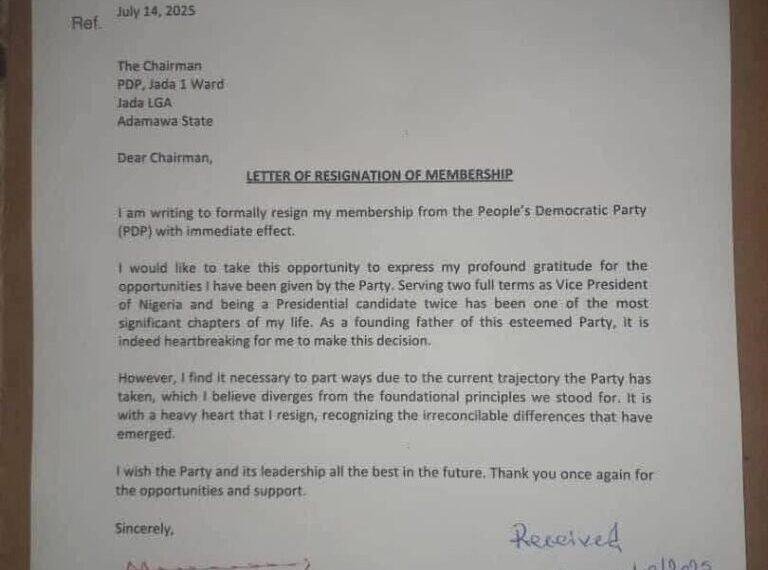Former Vice President Atiku Abubakar has come under intense public scrutiny and criticism for using Nigeria’s national coat of arms on his personal letterhead.
A move many Nigerians, including legal experts and civil society voices, have described as inappropriate, misleading, and potentially illegal.
The controversy erupted after a letter signed by Atiku surfaced on social media bearing the official coat of arms of the Federal Republic of Nigeria.
The letter, detailing his resignation from the People’s Democratic Party (PDP), recently, gave the impression of officialdom, despite Atiku no longer holding any public office.
Public Outrage and Legal Concerns
The backlash was swift and widespread. Critics accused the former vice president of attempting to cloak personal or political correspondence in the guise of official authority, thereby misleading the public and breaching the legal boundaries that protect national symbols.
“Nigerians deserve clarity, especially in a politically sensitive atmosphere,” said Barr. Esther. Daniel, a constitutional lawyer.
Related Articles:
Atiku’s Political Journey: A chronicle of defections since 1999
Keyamo slams Atiku over PDP resignation, accuses him of disrespecting Buhari’s mourning period
Atiku Abubakar quits PDP, declares party has lost its way
“The use of the coat of arms is strictly regulated under Nigerian law. It is a symbol of state authority, not personal branding.”
Civil society groups have also expressed concern over what they described as a trend among former public officials to continue projecting themselves as quasi-governmental figures long after leaving office.
“Using the coat of arms in a private capacity is not only misleading, it’s potentially a violation of the National Flag, Coat of Arms and Anthem Act,” said a Human Rights activist who simply identified himself as Ayodele. “Atiku is not above the law”, he added.
Presidency, Legal Experts Weigh In
While the presidency has not issued an official statement, sources within the legal advisory department of the Federal Executive Council say the matter could be escalated to the Attorney General’s office for interpretation and possible sanctions if deemed a breach.
According to legal precedent, unauthorized use of the coat of arms may attract penalties, including fines and imprisonment, though enforcement has historically been rare.
A senior lawyer and public affairs commentator, Dr. Ahmed Abubakar, added: “It’s either an egregious oversight or a deliberate act of misrepresentation.
“Either way, it undermines the sanctity of our national symbols and must be called out.”
Silence from Atiku’s Camp
As of press time, efforts to obtain a formal reaction from Atiku’s media office were unsuccessful.
The silence, however, has done little to calm the growing criticism, especially among youths who see the act as emblematic of the entitlement mindset of Nigeria’s political elite.
A Teachable Moment for Public Figures
Political analysts say the controversy underscores the urgent need to educate both public officials and the populace about the proper use of national insignia and the consequences of their misuse.
“It’s high time we stop tolerating these infractions,” said public policy analyst Ngozi Ejiofor.
“Symbolism matters. If a former vice president can casually appropriate a national emblem for private use, what message does that send about respect for institutions and rule of law?”
As Nigerians await an official explanation or apology from the former vice president, the incident continues to fuel debate about political accountability, the abuse of symbolism, and the ethical boundaries of public life.






